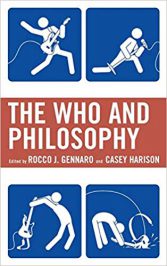According to the editors, this is the first study of some philosophical aspects that are connected with the rock band The Who (while there already are many books that deal with meaning and criticism in the lyrics and works of other famous pop stars).
 Naturally, all the authors share a common admiration for the band and their extraordinary record(s), although the style and the quality of the texts varies strongly. The altogether seventeen texts deal with various aspects in the band’s career, that now spans more than five decades.
Naturally, all the authors share a common admiration for the band and their extraordinary record(s), although the style and the quality of the texts varies strongly. The altogether seventeen texts deal with various aspects in the band’s career, that now spans more than five decades.
There are two texts that deal with the early days of The Who and the short period when they changed their name to The High Numbers (1964) and the first generation of Mods in the mid 1960s, and the Mod revival in the late 1970s. In the mid-sixties days, The Who’s main audience consisted of Mods, then a very visible and extremely fashion-minded youth subculture that influenced countless teenagers and other subcultures even after their disappearance in roughly 1969. The Mods perfectly represented what the early Who expressed musically, a stylish, fresh, and absolutely cool blend of English and American influences, fashion impulses from Italy and France, a brawny love for modern music (very much influenced by soul, jazz and rhythm and blues from the US) and weekends of heavy partying. The members of The Who to some extend were part of that subculture themselves, even if they already were somewhat older than the average Mod.
Naturally, the two groundbreaking rock operas Quadrophenia and Tommy, both also prominent music films, are treated here as well. The musical soundtracks of these operas are very important examples of the rock concept album.
The following chapters deal with alienation, (teenage) angst, difficult adolescent periods in those two operas/movies and suggest many interpretations of the two fictional characters by analyzing dozens of lyrics (written almost exclusively by Pete Townshend) and their genesis in the 1970s.
The live performances of The Who always had a special quality, from orgies of destruction that saw many guitars, drum kits and amplifiers literally go to pieces, to smoke bombs that went off in Pete Townshend’s feedback rings, all accompanied by their unbelievably loud sound (they once were called the loudest band on earth). The band attended two of the most important rock festivals ever, Monterey Pop and Woodstock. All of those particular features were still what most concert goers expected from The Who, even after the untimely death of the two excellent musicians Keith Moon (drums, † 1978) and John Entwistle (bass, † 2002).
Other texts deal with (possible) links to (then popular guru) Meher Baba, spirituality that forced its way into the compositions of Townshend, as did the topics of mental disorders, split personalities, and politically motivated attempts to improve society, even after the failing attempts of the hippies, changes brought on by the drug culture and various social experiments up into the mid-1970s.
Generally, the basis for many of the texts here are band interviews and mostly Townshend’s lyrics, who, not unlike Ray Davies of The Kinks, always related strongly to the British working class. A feature that rendered the band a lot of “authenticity.” Using these sources as the basis for research may have encouraged some authors to add personal experiences, memories of concert attendances and links to other bands of that time. For it always is a somewhat difficult enterprise to look for wisdom, answers to the questions of life in general and philosophical revelation in the lyrics of pop songs; as tempting as it is. There are hardly ever any short, witty or concise (and rhyming!) statements packed in pop lyrics that could substitute individual experience and hence simplify decision-making. Those lyrics naturally were not meant to be used in that way but tell of a unique and mostly fictional situation at a certain time. So maybe if the readers substitute the term “philosophy” in this title with “recurring themes in the lyrics of The Who” or “the philosophy of The Who,” it would help. Otherwise, the book may fall short of some reader’s expectations.
The editors Gennaro and Harison (both professors at the University of Southern Indiana) nevertheless have successfully compiled a selection of texts on a band and their followers who could only exist at that particular time. Taken into consideration the huge influence rock bands, popular music and movies had on at least one generation (that today holds many important offices in politics and the economy), The Who definitely did try to leave their mark, and they influenced many listeners.
This is also the first volume in a new series called “The Philosophy of Popular Culture.” Here we have a good compilation of texts that will appeal to anybody interested in popular music, British bands of the 1960s and of course The Who.
Review by Dr. A. Ebert © 2016
Rocco Gennaro and Casey Harison (eds.) The Who and Philosophy. (The Philosophy of Popular Culture). Lexington Books, 2016, 256 p.
